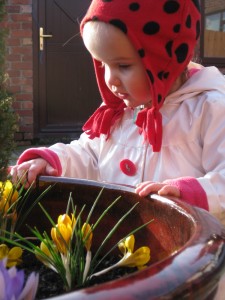February 28, 2011
We love Ilkley. Thank you, Jackson Brodie.
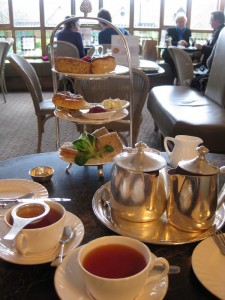 Today Harriet stayed home with her grandparents, and Stuart and I drove to Ilkley in Yorkshire (which is very close to Burley Cross country). I wanted to go to a Bettys Tea Room after reading Starting Early Took My Dog (which should probably receive a commission for our visit). Jackson Brodie certainly did not mislead us: if the Bettys girls ran the government, indeed, there
Today Harriet stayed home with her grandparents, and Stuart and I drove to Ilkley in Yorkshire (which is very close to Burley Cross country). I wanted to go to a Bettys Tea Room after reading Starting Early Took My Dog (which should probably receive a commission for our visit). Jackson Brodie certainly did not mislead us: if the Bettys girls ran the government, indeed, there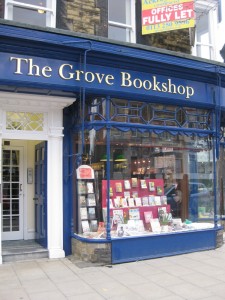 would not have been recent economic disasters, or disasters of any kind. Tea was completely delicious, definitely the best we’d had since Saturday, and I was particularly in love with the woman having her breakfast at the table across from ours’ (“Anything else for ye, Vera?” they asked as she was preparing to go, as she tied a kerchief around her hair).
would not have been recent economic disasters, or disasters of any kind. Tea was completely delicious, definitely the best we’d had since Saturday, and I was particularly in love with the woman having her breakfast at the table across from ours’ (“Anything else for ye, Vera?” they asked as she was preparing to go, as she tied a kerchief around her hair).
We had fun exploring the town afterwards, visiting the best butcher in Britain, and the Grove Bookshop, a fabulous independent bookshop whose business was booming. We got a steak and kidney pie at the former, and at the bookshop, I got a Penguin 75 tote bag, and Old Filth by Jane Gardam (which I’ve had out of the library twice, but have always had to return before I’ve had a chance to read it).
February 27, 2011
Can Lit?
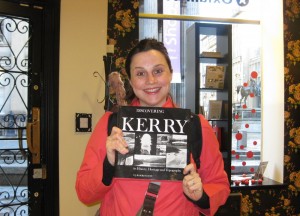 I br0ught a few Canadian novels with me, but have actually forgotten that Canada was ever such a place, so they’ve remained unopened in my suitcase. Instead, I’ve delighted in three epistolary novels in a row. The first was Daddy Long Legs by Jean Webster, which wasn’t remotely English, except for the umbrellas on the cover, and that was enough– I really liked it. Next was Burley Cross Postbox Theft, which was absolutely brilliant– I loved the ending. And on Friday, I read Felicity and Barbara Pym by Harrison Solow, which was even stranger than Nicola Barker’s novel, if such a thing was possible, but I adored it. The novel consists of correpondance from an
I br0ught a few Canadian novels with me, but have actually forgotten that Canada was ever such a place, so they’ve remained unopened in my suitcase. Instead, I’ve delighted in three epistolary novels in a row. The first was Daddy Long Legs by Jean Webster, which wasn’t remotely English, except for the umbrellas on the cover, and that was enough– I really liked it. Next was Burley Cross Postbox Theft, which was absolutely brilliant– I loved the ending. And on Friday, I read Felicity and Barbara Pym by Harrison Solow, which was even stranger than Nicola Barker’s novel, if such a thing was possible, but I adored it. The novel consists of correpondance from an 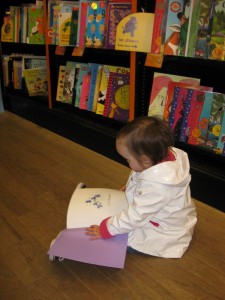 academic to a student undertaking the study of liberal arts at an American university who is about to begin a seminar on Barbara Pym. Who is unclear about why she should bother to read Barbara Pym, and the academic is unscathing in her criticism of the student’s point of view, of her limitations. Unbashedly snobbish (but not in all respects. She recommends Miss Read and Jilly Cooper’s Class in order to understand Pym’s world), as she takes down the student for her own provincialism and then proceeds to outline why we should bother reading Barbara Pym, as well as how we should approach the liberal arts, which is by drawing a connection between impeccable literary analysis and the wider world. Connections between the insular nature of Pym’s village life and ideas of the earth-centred universe, and the island mentality of the English anyway. Absolutely fascinating, and though I appreciated Barbara Pym before I read it, I picked up her Less Than Angels next, of course, and I am a better reader now.
academic to a student undertaking the study of liberal arts at an American university who is about to begin a seminar on Barbara Pym. Who is unclear about why she should bother to read Barbara Pym, and the academic is unscathing in her criticism of the student’s point of view, of her limitations. Unbashedly snobbish (but not in all respects. She recommends Miss Read and Jilly Cooper’s Class in order to understand Pym’s world), as she takes down the student for her own provincialism and then proceeds to outline why we should bother reading Barbara Pym, as well as how we should approach the liberal arts, which is by drawing a connection between impeccable literary analysis and the wider world. Connections between the insular nature of Pym’s village life and ideas of the earth-centred universe, and the island mentality of the English anyway. Absolutely fascinating, and though I appreciated Barbara Pym before I read it, I picked up her Less Than Angels next, of course, and I am a better reader now.
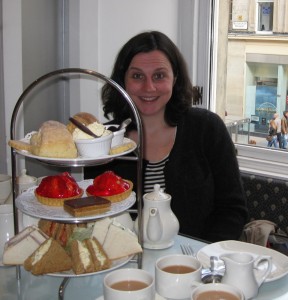 This weekend, we had a wonderful time in Glasgow with good friends (two of whom hopped over from Ireland for the occasion). The drive was lovely, the city was so vibrant and beautiful, and the sun shone and shone and we haven’t paid for it yet. Plus, we had afternoon tea at the Willow Tea Rooms, and had the kind of fun last night that is only possible in the company of the Scottish and the Irish. Tomorrow, to Yorkshire, and then a drive down South, then a day in London, and a day in Windsor, and before we know it, we’ll be home again, home again (and happy to be there. Though apparently, there is snow?).
This weekend, we had a wonderful time in Glasgow with good friends (two of whom hopped over from Ireland for the occasion). The drive was lovely, the city was so vibrant and beautiful, and the sun shone and shone and we haven’t paid for it yet. Plus, we had afternoon tea at the Willow Tea Rooms, and had the kind of fun last night that is only possible in the company of the Scottish and the Irish. Tomorrow, to Yorkshire, and then a drive down South, then a day in London, and a day in Windsor, and before we know it, we’ll be home again, home again (and happy to be there. Though apparently, there is snow?).
February 24, 2011
At the seaside
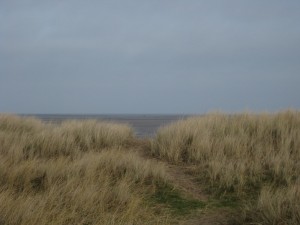
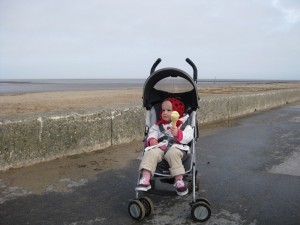 “Oh, but she never wanted James to grow a day older! or Cam either. These two she would have liked to keep for ever just as they were, demons of wickedness, angels of delight…”
“Oh, but she never wanted James to grow a day older! or Cam either. These two she would have liked to keep for ever just as they were, demons of wickedness, angels of delight…”
February 24, 2011
Report from the (wrong side of the) road
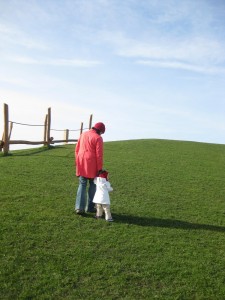 The most amazing thing that ever happened to me happened on our trip to the UK in 2007 when I predicted that our car rental would be upgraded to a Saab convertible, and it was, and so we drove with the top down from North Yorkshire over the dales, across the Pennines until it started to rain– it was perfect. Similar fortune wouldn’t have worked as well this time, as the carseat would have been a tight squeeze in the Saab, and there would be no room for our enormous suitcases. Besides, the Saab was far too wide for maneuvering down English roads, I kept scraping the alloy wheels against curbs, and got charged 200 pounds (which brought our total up to the cost of a Saab in the first place, and so it goes).
The most amazing thing that ever happened to me happened on our trip to the UK in 2007 when I predicted that our car rental would be upgraded to a Saab convertible, and it was, and so we drove with the top down from North Yorkshire over the dales, across the Pennines until it started to rain– it was perfect. Similar fortune wouldn’t have worked as well this time, as the carseat would have been a tight squeeze in the Saab, and there would be no room for our enormous suitcases. Besides, the Saab was far too wide for maneuvering down English roads, I kept scraping the alloy wheels against curbs, and got charged 200 pounds (which brought our total up to the cost of a Saab in the first place, and so it goes).
No, this time I predicted that we’d get upgraded to first class on the flight over, and I’m not sure if I’m psychic, or merely good at conjuring realities, but it worked again, and our flight was a dream. We were not so first class that we got to sleep in pods and actual silverware, but we got comfortable seats and foot-rests, and a kit with earplugs and an eye-mask. We actually slept! Arriving in London on Sunday morning, feeling much better than we’d ever imagined we would.
Since then, we have seen old friends, Harriet has played with scores of children, we have driven 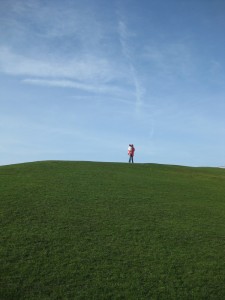 from Berkwhire to Lancashire, I have mastered round-abouts, I avoided hitting a pheasant on a very scary journey along a two lane road with brick walls built up on either side, many twists and turns, a 100km speed limit, and some points at which the two lanes were narrowed to one. I am reading The Burley Cross Postbox Theft by Nicola Barker, which is the best possible book I could be reading at this time. Tomorrow we are driving to Scotland to see friends from our Japan days who we haven’t seen since our wedding five and a half years ago. Today we walked along the sea front, and Harriet watched the tide come in, and the sun shone, and it was lovely. When the sun shines here, people like to tell you that we’ll pay for it later. We have been eating copious amounts of cake and tea and scones. On Monday, Stuart and I are taking a trip for afternoon tea in at Bettys in Ilkley, because Ilkley is the constabulary serving Burley Cross. We’re looking forward to a day in London near the end of next week, and another day exploring Windsor.
from Berkwhire to Lancashire, I have mastered round-abouts, I avoided hitting a pheasant on a very scary journey along a two lane road with brick walls built up on either side, many twists and turns, a 100km speed limit, and some points at which the two lanes were narrowed to one. I am reading The Burley Cross Postbox Theft by Nicola Barker, which is the best possible book I could be reading at this time. Tomorrow we are driving to Scotland to see friends from our Japan days who we haven’t seen since our wedding five and a half years ago. Today we walked along the sea front, and Harriet watched the tide come in, and the sun shone, and it was lovely. When the sun shines here, people like to tell you that we’ll pay for it later. We have been eating copious amounts of cake and tea and scones. On Monday, Stuart and I are taking a trip for afternoon tea in at Bettys in Ilkley, because Ilkley is the constabulary serving Burley Cross. We’re looking forward to a day in London near the end of next week, and another day exploring Windsor.
And most of all we’re looking forward to the fact that we’ve been away for nearly a week, and our vacation isn’t even half over.
February 19, 2011
If you need me…
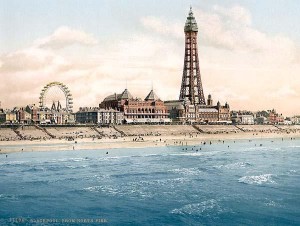 …I will be beside the seaside. In February, no less! And with my computer, so you’ll be hearing from me from time to time.
…I will be beside the seaside. In February, no less! And with my computer, so you’ll be hearing from me from time to time.
February 16, 2011
Light at the end of the tunnel
 On Saturday, we are going to England, baggage handler strike notwithstanding, and don’t worry, I have a new spring coat (the Christine trench, in geranium) because the weather is calling for rain. We are going for two weeks! I have never gone on a two week vacation in adulthood– this is a monumental occasion. I am exited about numerous things, and terrified about others (round-abouts!). But mostly at the moment, I am excited about books. I had a bunch of books to read for various reasons in the last two weeks, and then all my Toronto Library holds came in at once, so that reading is about all I’ve been doing this last while. But as soon as I’m finished with my final library book, I am going to read magazines until our departure, because, of course, I have to start every journey with a fresh book. It’s a superstition of mine.
On Saturday, we are going to England, baggage handler strike notwithstanding, and don’t worry, I have a new spring coat (the Christine trench, in geranium) because the weather is calling for rain. We are going for two weeks! I have never gone on a two week vacation in adulthood– this is a monumental occasion. I am exited about numerous things, and terrified about others (round-abouts!). But mostly at the moment, I am excited about books. I had a bunch of books to read for various reasons in the last two weeks, and then all my Toronto Library holds came in at once, so that reading is about all I’ve been doing this last while. But as soon as I’m finished with my final library book, I am going to read magazines until our departure, because, of course, I have to start every journey with a fresh book. It’s a superstition of mine.
I am going to take Jean Webster’s Daddy Long Legs with me to read, and on a six hour flight with a toddler, my goal is to read at least five pages. Once we’re settled and Harriet is in the care of her grandparents, however, there will be reading time aplenty (fit in around trips out for cream teas). I am also going to read my final Canada Reads Independently book, Lynn Coady’s Play the Monster Blind, and I am bringing an ARC of Timothy Taylor’s new book The Blue Light Project.
Whilst in England, I plan on buying Burley Cross Postbox Theft by Nicola Barker, a novel by Rachel Cusk (but which. Any suggestions? I’ve only read Arlington Park and A Life’s Work), and a very odd book called Felicity and Barbara Pym by Harrison Solow, which isn’t actually British, but oh well. I will probably buy many other books too, especially since we are going to visit the London Review Bookshop (which is also a cake shop).
Once I’m home again, there’s a packed shelf of books I’m looking forward to bringing in the spring with, books that are too big for travel: Allison Pearson’s I Think I Love You, the new PEN Anthology Finding the Words, and Zsuzsi Gartner’s story collection Better Living Through Plastic Explosives. Among others, oh yes. Many, many others.
February 16, 2011
Wild libraries I have known: The Whitby Public Library
 My childhood is lost to me, and so is its library. Which is not the library pictured here, the Whitby Carnegie Library. That one was “the old library”, now dental clinic, or something, but it recently came as a shock to me realize that my library is now the old library too. As lost to the physical world as it is to my memory, but first let me tell you about the fragments I have shored against the ruins.
My childhood is lost to me, and so is its library. Which is not the library pictured here, the Whitby Carnegie Library. That one was “the old library”, now dental clinic, or something, but it recently came as a shock to me realize that my library is now the old library too. As lost to the physical world as it is to my memory, but first let me tell you about the fragments I have shored against the ruins.
I remember that the Whitby Public Library had very few windows, and it had the vibe of a basement, but this never bothered me, because it was the library. I used to go and check out chapter books, stack them on my bedside table and rotate through the entire stack one chapter after another. Someone once suggested that this was a strange way to approach a pile of books, and I couldn’t fathom what they were talking about. I used to dog-ear my pages. I used to read the last page first.
The Whitby Public Library had a cable access show whose theme song was some guy strumming a guitar and singing the lyric, “Strawberries, fresh strawberries. Cream and sugar, you just can’t wait!” Or something like that– perhaps I dreamed the whole thing. But I distinctly remember learning to draw a 3-dimensional-seeming chair after viewing a lessons on such things on the library show. I remember that the Chief Librarian was also an author, and he was Ken Roberts, who’d written Pop Bottles and Hiccup Champion of the World.
I hardly remember the library, in spite of its centrality to my early existence (and the centrality I do remember. The library was always a place of reverence). So I was excited to rediscover it via Google, make it truly a Wild library I have known (instead of a wild library I can scarcely recollect), except then I discovered that the library had been torn down. In fact, that it hadn’t even been a library at all. When the old library (pictured above) outgrew itself, the Whitby Public Library was moved into a temporary location in a former municipal building where it would live for nearly thirty years.
When a brand new state of the art library was opened in 2005 (and it is impressive. I’d include a photo, except it’s a library I’ve never known), the library of my childhood was reduced to rubble.
Update 2019: I have found photos of the library of my childhood online via the Whitby archives!! You can see them here, here, here, here, and here. And since I wrote this post 8 years ago, I HAVE visited the new Whitby Public Library, and it’s wonderful. I am going to be back there next week in conversation with my friend Marissa Stapley and it’s going to be fun.
February 15, 2011
More on the motherhood narrative
![]() Lately, reading Susan Olding’s book Pathologies (and in particular, her essays about infertility and her daughter’s adoption) and Charlene Diehl’s Out of Grief, Singing (as recommended by Alison Pick), I was struck by how various is the motherhood narrative. And yet the universality of these stories– these women, with their extraordinary experiences of motherhood, managed to articulate so much that I’ve only been gesturing toward since I became pregnant two and a half years ago. Partly because the writing here is so remarkable. This might also be because I’m self-absorbed, and project myself onto everything. But still, how these stories resonated, and also taught me new things about the motherhood experience, added the possibility of additional dimensions to my journey.
Lately, reading Susan Olding’s book Pathologies (and in particular, her essays about infertility and her daughter’s adoption) and Charlene Diehl’s Out of Grief, Singing (as recommended by Alison Pick), I was struck by how various is the motherhood narrative. And yet the universality of these stories– these women, with their extraordinary experiences of motherhood, managed to articulate so much that I’ve only been gesturing toward since I became pregnant two and a half years ago. Partly because the writing here is so remarkable. This might also be because I’m self-absorbed, and project myself onto everything. But still, how these stories resonated, and also taught me new things about the motherhood experience, added the possibility of additional dimensions to my journey.
I also can’t help thinking about how I would critique Diehl’s memoir if it were a novel– during most of her daughter’s brief life in the NICU, Diehl was suffering from a variety of post-birth complications and hardly saw her before she died. In a stupid workshop, I would insist on moments of connections, on the impossibility of these parallel storylines (mother and baby both in physical trauma), it doesn’t unfold like a story (but then, from what I’ve heard, death rarely does). We have to bend life a certain way to make it work in fiction, but real life doesn’t bend, does it. And how Diehl makes something so beautiful of it still, the unbendingness of real life. There is such generosity in her story, such grace, and though I’ve sobbed off and on today as I’ve read her book, so often I’ve been crying because of the joy.
February 15, 2011
Canada Reads Independently 4: Still Life With June by Darren Greer
 The connections between the four books I’ve read so far for Canada Reads Independently are really quite remarkable: each is a book constructed of fragments, truth is always a construction, the truth-teller functions as a creator, and these are books that test the limits of fiction (even Mavis Gallant’s, who calls the Linnet Muir stories “as close to autobiography as fiction can be”).
The connections between the four books I’ve read so far for Canada Reads Independently are really quite remarkable: each is a book constructed of fragments, truth is always a construction, the truth-teller functions as a creator, and these are books that test the limits of fiction (even Mavis Gallant’s, who calls the Linnet Muir stories “as close to autobiography as fiction can be”).
None of the others do any of these things, however, with quite as much unbridled nerve as Darren Greer’s novel Still Life With June. Greer’s narrator Cameron Dodds is an unsuccessful writer (“a loser who knows he’s a loser”: do note how such an admission clears a guy of so much responsibility) who publishes under a variety of pen names, including “Darren Greer”. Cameron works nights at a Salvation Army Treatment Centre (where he’s carved out a niche for himself– he’s the gay guy who breaks up brawls by standing in the middle and screeching songs from “Annie”), whose clients he mines for their stories. He attends a writers group at a local bookstore where he never speaks, and certainly the other writers’ stories are of no use to him, but the stories of the writers themselves are gold to him, these poor pathetic people wasting their time.
He’s a story vampire, so desperate for his next fix that he breaks into the file of a client, Darrel Greene, a former addict who recently committed suicide, and discovers that he had a sister, institutionalized with Down’s Syndrome, who Darrel felt guilty about never taking care of. Cameron decides to pretend to be Darrel, connects with the sister, June, and discovers depth to his character in the process. At the same time, he also forms a relationship with a woman from his writing group who has a few aliases of her own, and a troubled relationship with her brother (who is Cameron’s upstairs neighbour).
There are weaknesses in the plot, but Greer has structured his book to escape all scrutiny. For example, Cameron reports that he’s “not really sure why” he decides to go and meet Darrel’s sister June, which is the sort of flimsy construction I can’t stand, but events transpire at end of the story to reveal that there’s more to the story than that. This happens several times in the text actually, when I thought the plot was lost, and then Greer revealed another trick up his sleeve.
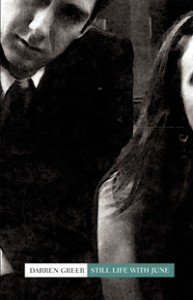 June’s character also remains decidedly two-dimensional, though Cameron is upfront about his/Darrel’s inability to imagine the world through her eyes– to show her as anything more than this would be a violation of Cameron’s perspective. She’s two-dimensional for a reason, but yes, that two-dimensionality has a purpose, but sometimes I wonder if we’re letting the book get away with too much.
June’s character also remains decidedly two-dimensional, though Cameron is upfront about his/Darrel’s inability to imagine the world through her eyes– to show her as anything more than this would be a violation of Cameron’s perspective. She’s two-dimensional for a reason, but yes, that two-dimensionality has a purpose, but sometimes I wonder if we’re letting the book get away with too much.
I was also uncomfortable with the language here, the use of the word “retard”, and it all got a bit Huck Finn on me. And yes, those of us with purely literary intentions can argue context, but I sometimes wonder if those to whom these words are personal have something to teach the rest of us. That there is more to life than literature, perhaps, and that some of us who love words best are blissfully ignorant as to their power, to how they work. So yes, I was uncomfortable, but I also think that I was supposed to be, and that Greer draws parallels between “retard” and “faggot” that made me thing the term wasn’t flung as randomly as Cameron Dodds presented it as being. I think the whole book was an exercise in uncomfortable-making anyway.
Anyway, the whole thing came together marvelously for me in the end, and though much about the book remained ambiguous, I was satisfied– all the right questions were answered, and I was content to let the others go in a way I wasn’t as happy with in Truth and Bright Water. It was a bleak book, but with passages of levity (whose big box bookstore setting also made me think of a very different book, Corey Redekop’s Shelf Monkey, which I also enjoyed). And it was a book that surprised me time and time again, and always just when I thought it couldn’t surprise me anymore.
Canada Reads Independently Rankings:
1) Still Life With June by Darren Greer
2) Truth and Bright Water by Thomas King
3) Home Truths by Mavis Gallant
4) Be Good by Stacey May Fowles
